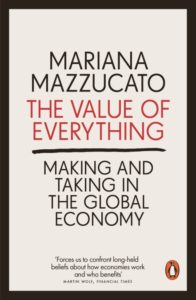
Introduction
The Value of Everything is an economic book. It aims to stir a debate about “value” in current turbulent economic times. This book is chosen as one of the best business books 2018 in the economics category by strategy+business magazine.
Author
Mariana Mazzucato is an economist and Professor in Economics of Innovation and Public Value at University College London. She is also the founder of Institute for Innovation and Public Purpose in the same institution. The author is a member of the Scottish Government’s Council of Economic Advisers and UN Committee for Development Policy. She is an avid author who has published 10 books.
Content
This book begins with an introduction and contains 9 chapters. Chapter 1 is A Brief History of Value, followed by Value in the Eye of the Beholder: The Rise of the Marginalists. In these 2 chapters, the author introduces selected theories of classical and neoclassical economics. Chapter 3 is Measuring the Wealth of Nations and talks about gross domestic product. Chapter 4 is A Colossus is Born. The Rise of Casino Capitalism is Chapter 5. These chapters discuss the changes in the financial system. Chapter 6 and 7 are Financialization of the Real Economy and Extracting Value through the Innovation Economy respectively. They are about how value extraction occurs in the economy. Undervaluing the Public Sector is Chapter 8. This chapter tries to dispel the misconceptions on the public sector. The final chapter is The Economics of Hopes and includes the author’s reform proposal.
Review
The Value of Everything is an economics book that challenges the conventional view on value. Nowadays, we equate price to value, regardless of whether a service or product is adding value or extracting value from the society. However, the author opines that the core of value is the production of new goods and services, instead of the price.
Due to the change in the thinking regarding value, finance changes from being wealth transferring to wealth creation in around 1970. Financial sector was treated as value extractor before the decision to ascribe ‘value-added’ to banks and their financial-market activities.
The notion of maximizing shareholder value in the stock market has led to the focus on the short-term profit, and in most occasions, by jeopardizing the long-term profitability. Besides that, the author also questions the primacy of shareholder profit in the book. She proposes to maximize stakeholder value instead.
According to the author, economics is inseparable from politics and is not a hard science like physics. Therefore, it should be treated like social sciences. She cautions that attempt to separate economics and politics is bound to lead to failures.
Government is not inherently unproductive as the popular view claims. On the contrary, it has many contributions to the society. But the values added are not being recorded. Furthermore, the government has a role in reining in the expanding financialization. It could institute different types of policy to tilt the playing field in the direction deemed desirable instead of simply removing barriers so that businesses can get on with smooth production.
In conclusion, we need to redefine value and reconsider whether a sector is adding or extracting value from the economy instead of blindly heeding their narratives.
Sidenote: One interesting finding that I discovered is that private retirement scheme in Malaysia might be modelled after United Kingdom and United States. Their governments have long given pension savings significant tax advantages and we are enjoying similar benefit in Malaysia.
Quotes
- What we measure affects what we do; and if our measurements are flawed, decisions may be distorted.
- But if an intermediation service becomes more efficient, it should absorb less of its client’s output rather than more; it should make a smaller contribution to GDP the more efficient it gets.
- If something is free online, you are not the customer, you are the product.
- What matters is not the deficit but what the government is doing with its funds.
- A green revolution will require deliberate and conscious changes in social values: a redirection of the entire economy, transforming production, distribution and consumption in all sectors.
Rating

Interested in The Value of Everything?
You may get the book from Kinokuniya Malaysia through the link below*.
*Disclosure: The above link is Involve Asia affiliate link. Thus, I may earn a small commission when you purchase the book through this link.

No Comments